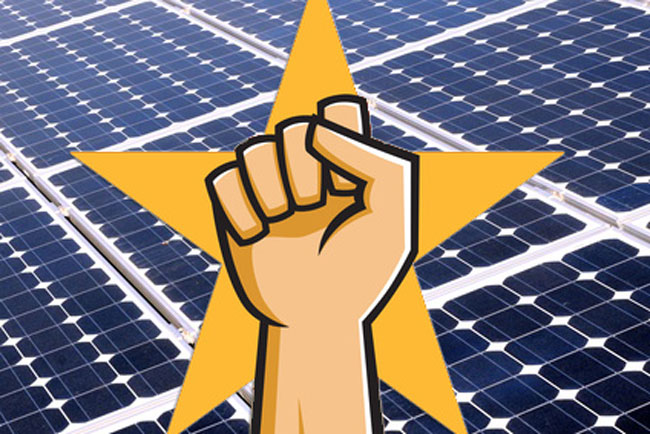The dominant role that renewables — particularly solar — will play in the future of our energy consumption seems to have finally sunk in at the Big End of Town. In Europe at least. A recent report from financial giant UBS of Zurich is predicting nothing less than a solar technology revolution.
The hard-hitting briefing paper for investors and clients questions the long term relevance of large-scale coal-fired power plants by predicting their demise within 10-20 years. It says that solar energy and storage will be
“disruptive technologies for the electricity system” and that “steeply declining battery and solar system costs will enable multiple new applications” in the energy sector.
The findings are aimed at the bank’s big investors, which makes it all the more worrying for those with significant investments in coal and oil. Indeed the bank’s message would surely have sent a chill down the spine of Big Fossil Fuel here in Oz as well as around the world.
Crucially UBS, one of the largest and most powerful banks in the world, says the revolution will occur with or without government subsidies. While the report is aimed at the European energy market, it has increasing relevance in Australia as all semblance of support for renewables is rapidly eroded.
The key to the bank’s recommendations has been the falling price of solar in Europe. This to the extent that it will become cost effective for households and businesses to generate their own power and store surplus energy — with or without government support.
However UBS is not just noting the inevitable shift towards a renewable energy future but a change in the way we access our energy. According to the bank this shift will occur with solar — in combination with electric cars and battery storage — at the vanguard of the change.
“Power is no longer something that is exclusively produced by huge, centralised units owned by large utilities,” it predicts.
“By 2025, everybody will be able to produce and store power. And it will be green and cost competitive, ie, not more expensive or even cheaper than buying power from utilities,” say the authors, who urge their financial clients to “join the revolution.”
The importance of the bank’s briefing paper cannot be overstated. With government subsidies being phased out in many countries, it will be the banks that give the go-ahead or otherwise to large scale renewable energy schemes. In other words the buck stops with them. The banks will only back renewable schemes (such as solar farms) if they can see a financial return.
The UBS paper — so supportive of solar, battery and electric technology — will therefore herald a shift in thinking by the conservative financial institutions towards becoming willing partners in potentially lucrative renewable schemes such as solar farms.
It can’t be long before this thinking — and financial backing — from the Big End of Town laps up on to our shores.
If that doesn’t sound like a solar technology revolution, nothing does!


 RSS - Posts
RSS - Posts



Having just returned from a trip to Europe, I was staggered by the amount of wind turbines and solar farms I saw throughout Northern Germany and Denmark. Almost every farmhouse roof and rickety barn was completely covered by solar panels. Couldn’t help thinking how out of touch with reality the Abbot government is. I hope the Renewable Energy industry will launch legal action against these environmental vandals and climate deniers. I’m halfway through a Cert IV course in Renewable Energy and beginning to wonder if there’s any point continuing it in this country? I guess I could move to Germany!
Great comment thanks Evan. My thinking is there are swings and roundabouts in politics and Australia needs people like you here. Indeed the power will soon price themselves out of the energy market through their greed anyway.
10 – 20 years eh? Good news. Seems like the RET’s no longer required then
HI Muzz,
The RET is absolutely needed because:
a) We need to compete with a heavily subsidised fossil powered staus quo. There are many historic and current subsidies in the energy sector. These range from government-built power stations to tax breaks that lower the cost of coal mining. The International Monetary Fund has calculated that post-tax energy subsidies to oil, coal and gas in Australia amounted to over $23 billion in 2011 alone.
b)The Renewable Energy Target is a way of correcting the electricity market to ensure it is not distorted by ignoring particulate pollution, climate change and their impacts. In a world where the costs of particulate pollution and climate change are explicitly priced and factored into decision-making the RET may not be necessary, but until this is the case such corrective subsidies will be required.
(more at http://www.businessspectator.com.au/article/2014/8/28/policy-politics/ret-market-distorting-subsidy)
Cheers,
Finn
How exactly is fossil fuel (coal) subsidised? I had always thought the govt got royalties from coal
The market doesn’t capture externalities from coal use that don’t exist for renewable generation. For example, coal pollution costs us thousands of years of life per year. (You can look up studies on this to find estimates.) A year of life lost is valued by the government at around $200,000. So just 1,000 years of life lost is considered a cost to the nation of $200,000,000. Then there’s the cost to agriculture from ozone pollution, damage to buildings from acid rain, and environmental costs from global warming.
Muzz, pollution and greenhouse gases kill people. All else equal, more people will die without an RET than with it.
Pollution might, but CO2 certainly doesn’t